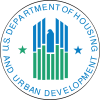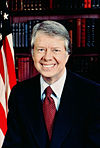- Moon Landrieu
-
Moon Landrieu 
7th United States Secretary of Housing and Urban Development In office
September 24, 1979 – January 20, 1981President Jimmy Carter Preceded by Patricia Roberts Harris Succeeded by Samuel Pierce 56th Mayor of New Orleans, Louisiana In office
May 2, 1970 – May 1, 1978Preceded by Victor H. Schiro Succeeded by Ernest Nathan Morial Councilmember at Large, City Council of New Orleans In office
1966–1970Member of the Louisiana House of Representatives In office
1960–1966Personal details Born July 23, 1930
Uptown New Orleans, LouisianaPolitical party Democratic Spouse(s) Verna Satterlee Landrieu Children Nine children, including
Sen. Mary Landrieu and
Mayor of New Orleans Mitch LandrieuAlma mater Loyola University New Orleans Profession Attorney; Politician Religion Roman Catholic Military service Service/branch United States Army Years of service 1954-1957 Maurice Edwin "Moon" Landrieu (born July 23, 1930) is a Democratic politician from Louisiana who served as Mayor of New Orleans from 1970–1978. He also is a former judge. He represented New Orleans' Twelfth Ward in the Louisiana House of Representatives from 1960 to 1966, served on the New Orleans City Council as a member at-large from 1966 to 1970 and was the United States Secretary of Housing and Urban Development under U.S. President Jimmy Carter from 1979–1981.
Contents
Early life and career
Moon Landrieu was born in Uptown New Orleans, the son of Joseph G. Landrieu (owner of a small corner grocery) and the former Loretta Bechtel. While his birth name was Maurice, he acquired the nickname "Moon" in his early childhood, and later had his name legally changed. He went to Jesuit High School. A promising athlete, Landrieu won a baseball scholarship at Loyola University New Orleans, where he received a bachelor of arts in business administration in 1952 and a law degree in 1954. As an undergraduate, he was elected student body president at Loyola. After a three year stint in the United States Army, Landrieu opened a law practice and taught accounting at Loyola. In 1954, Landrieu married Verna Satterlee, with whom he had nine children (Mary, Mark, Melanie, Michelle, Mitchell, Madeleine, Martin, Melinda, and Maurice Jr.).
In the late 1950s, Landrieu became involved in the youth wing of Mayor deLesseps Morrison's Crescent City Democratic Organization. Running on Morrison’s ticket, Moon Landrieu was elected by the 12th Ward of New Orleans to the Louisiana House of Representatives in 1960. There he was one of the few white legislators who voted against the "hate bills" of the segregationists which the legislature passed in the effort to thwart the desegregation of public facilities and public schools.
In 1962, Landrieu ran for New Orleans City Council and lost, but in 1966, Landrieu was elected Councilman-at-large. In 1969, he led a successful push for a city ordinance outlawing segregation based on race or religion in public accommodations, an issue that had been addressed nationally in the Civil Rights Act of 1964. As councilman, Landrieu also voted to remove the Confederate flag from the council chambers and voted to establish a biracial human relations committee. He succeeded with both votes.
Landrieu as mayor
Moon Landrieu was elected mayor of New Orleans in the election of 1970 to succeed fellow Democrat Victor Schiro. His opponent in the Democratic primary runoff was Louisiana Lieutenant Governor Jimmy Fitzmorris, who was supported by most of the municipal political establishment. Running on a "progressive" platform, Landrieu won an unexpected victory by assembling a coalition comprising 90 percent of black voters and 39 percent of whites. Perennial candidate A. Roswell Thompson, the operator of a taxi stand and a member of the Ku Klux Klan, ran again for mayor in the Democratic primary but polled negligible support.
In the general election, Landrieu defeated Ben C. Toledano, the only Republican to make a serious bid for mayor of New Orleans in the 20th century. In that contest, Landrieu's pro-civil rights stance was rewarded when he received an overwhelming 99 percent support from black voters.
During his tenure as mayor, Landrieu oversaw desegregation of city government and public facilities as well as encouraging integration within business and professional organizations. Before Landrieu was elected, there were no high-ranking black employees or officials in City Hall; he worked actively to change this by appointing African Americans to top positions, including Chief Administrative Officer, the number two position in the executive branch of city government. When Landrieu took office in 1970, African Americans made up 19 percent of city employees; by 1978, this number had risen to 43 percent.[1] He also appointed Rev. A.L. Davis, a prominent civil rights leader, to fill a temporary vacancy on the City Council; Davis thus became the city’s first black city councilor.
Landrieu was able to obtain federal funds for the revitalization of New Orleans' poor neighborhoods, and he promoted the involvement of minority-owned businesses in the city's economic life. Like his predecessor, Landrieu presided over continued suburban-style growth in the Algiers and New Orleans East districts, with Algiers essentially built-out, having exited its greenfield development stage, by the end of his administration. New Orleans East, though far from fully developed, had by that time arrived at a place of considerable, visible affluence relative to the metropolitan area, with upscale, multi-million dollar residential and commercial developments debuting alongside new office buildings and modern business parks. Landrieu was also involved in the planning and construction of the Louisiana Superdome, the Piazza d'Italia, and other projects designed to improve the economy of New Orleans. He advocated the creation of the Downtown Development District to revitalize the New Orleans CBD, and worked to promote the city’s growing tourism industry. His tourism-related projects included the Moon Walk, a riverfront promenade facing the French Quarter, the Louisiana Superdome, as well as renovations of the French Market and Jackson Square. Critics alleged that patronage from these development projects disproportionately aided his campaign contributors, most notably his political allies who controlled Superdome Services, Inc.
By the midpoint of Vic Schiro's mayoral administration (i.e., the mid-1960s), New Orleans' historic built environment was under siege, as an accelerating number of building demolitions were approved. Unprecedented intrusions into the existing urban fabric were also being contemplated, such as the elevated Claiborne Expressway and Riverfront Expressway segments of I-10. Responding to the ongoing erosion of the city's existing built environment, Landrieu authorized the 1972 New Orleans Housing and Neighborhood Preservation Study. Most of that study's recommendations were enacted by Landrieu, including the 1976 establishment of the Historic District Landmarks Commission ("HDLC"), which extended design review and demolition controls to parts of New Orleans outside of the French Quarter for the first time.[2] The near-simultaneous enactment of generous federal tax incentives favoring the rehabilitation of historic buildings combined with the HDLC's creation to encourage hundreds of historic tax credit-subsidized redevelopment projects in the ensuing decades, representing hundreds of millions of dollars of new investment, most notably within New Orleans' downtown and Warehouse District.
During 1975–1976, Landrieu served as president of the United States Conference of Mayors. Landrieu became nationally known as an advocate for American cities in Washington, D.C., and was credited with helping to convince Congress to bail out New York City during its financial crisis.
He was reelected in 1974 and served until April 1978. After leaving office, he was succeeded by the city's first black mayor, Dutch Morial.
Landrieu was the last white mayor of New Orleans until his son, Mitch, was elected mayor of New Orleans in 2010.
After city hall
After leaving office in 1978, Landrieu served as Secretary of the United States Department of Housing and Urban Development (HUD).
Landrieu served as Judge of the Louisiana 4th Circuit Court of Appeals from 1992 until his retirement in 2000.
He is the father of U.S. Senator Mary Landrieu and of current New Orleans Mayor Mitch Landrieu.
In 2004, Landrieu was inducted in the Louisiana Political Museum and Hall of Fame in Winnfield. His daughter Mary was inducted into the organization three years later. [3]
References
- ^ Morial retains racial mix inherited from Landrieu, The Times-Picayune, May 6, 1980.
- ^ Wholesale demolition is a discredited approach, The Times-Picayune, February 6, 2010.
- ^ Winnfield, La - Old L&A Depot, LA Political Museum
Bibliography
- Baker, Liva. The Second Battle of New Orleans: The Hundred Year Struggle to Integrate the Schools. Harper Collins, 1996.
- Hirsch, Arnold and Joseph Logsdon. Creole New Orleans: Race and Americanization. LSU Press, 1992.
- Perez, Dawn Watts. “Moon Landrieu: Reflections of Change.” UNO Masters Thesis, 1996.
External links
Louisiana House of Representatives Preceded by
J. Marshall Brown (D)State Representative, New Orleans' Twelfth Ward
1960–1966Succeeded by
Eddie Sapir (D)Political offices Preceded by
James Fitzmorris (D) & Joseph DiRosa (D)Councilmembers at Large, New Orleans Moon Landrieu (D) & John Petre (D)
1966–1970Succeeded by
James Moreau (D) & Joseph DiRosa (D)Preceded by
Victor Schiro (D)Mayor of New Orleans
1970–1978Succeeded by
Ernest "Dutch" Morial (D)Preceded by
Patricia Roberts HarrisUnited States Secretary of Housing and Urban Development
Served under: Jimmy Carter
1979-1981Succeeded by
Samuel Riley PierceUnited States Secretaries of Housing and Urban Development 
Mayors of New Orleans, Louisiana de Boré • Pitot • Watkins • Mather • Trudeau • Girod • Dorgenois • Girod • Macarty • de Roffignac • Prieur • Bertus • Genois • Freret • Prieur • Bertus • Freret • Montegut • Crossman • Lewis • Waterman • Stith • Monroe • Shepley • Weitzel • French • Weitzel • Deming • Miller • Durell • Miller • Hoyt • Kennedy • Quincy • Burke • Kennedy • Rozier • Clark • Monroe • Heath • Conway • Flanders • Wiltz • Leeds • Pilsbury • Patton • Shakspeare • Behan • Guillotte • Shakspeare • Fitzpatrick • Flower • Capdevielle • Behrman • McShane • Behrman • O'Keefe • Walmsley • Pratt • Earhart • Cave • Maestri • Morrison • Schiro • M. E. Landrieu • E. Morial • Barthelemy • M. Morial • Nagin • M. J. Landrieu
Presidents of the United States Conference of Mayors Murphy · Curley · Walmsley · Hoan · La Guardia · Kelly · Welsh · Green · Lawrence · Kennelly · Burke · Robinson · Hynes · Wagner · Poulson · R. J. Daley · Dilworth · Burns · Celebrezze · Lee · Selland · Tucker · Blaisdell · Cavanagh · Barr · Schrunk · Maltester · Tate · Maier · Welch · Martin · Alioto · Landrieu · Gibson · Alexander · McNichols · Carver · Hatcher · Boosalis · Young · Fulton · Padilla · E. Morial · Riley · Berkley · Holland · Whitmire · Isaac · Flynn · Althaus · Abramson · Ashe · Rice · R. M. Daley · Helmke · Corradini · Webb · Coles · M. Morial · Menino · Garner · Plusquellic · O'Neill · Guido · Palmer · Diaz · Nickles · Kautz · Villaraigosa
Categories:- 1930 births
- Louisiana state court judges
- Louisiana lawyers
- New Orleans City Council members
- American people of French descent
- American people of Italian descent
- Landrieu family
- Living people
- Louisiana Democrats
- Jesuit High School alumni
- Mayors of New Orleans, Louisiana
- Members of the Louisiana House of Representatives
- United States Secretaries of Housing and Urban Development
- United States Army personnel
- Carter administration personnel
Wikimedia Foundation. 2010.

